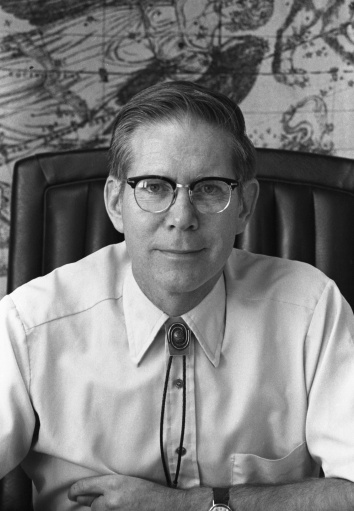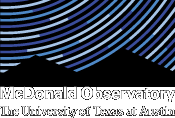On August 25, McDonald Observatory commemorates what would have been the 100th birthday of Harlan James Smith. He was the Observatory’s director from 1963 to 1989, a period of lasting impact on the site’s facilities, public outreach programs, and place within the greater astronomy community.
Smith was born in Wheeling, West Virginia, on August 25, 1924. In his final year of high school, he was named runner up in the prestigious Westinghouse National Science Talent Search. In 1943, he joined the U.S. Army Air Corps, performing weather observations at various U.S. bases during World War II. After the war, Smith studied at Harvard University, graduating with a Ph.D. in astronomy.
After a decade teaching astronomy at Yale University, Smith came to The University of Texas at Austin to become the chairman of its developing astronomy department and serve as the first Texas-based director of McDonald Observatory. Prior to his arrival, the Observatory was operated in partnership with the University of Chicago. In preparation for the handoff, UT established a department of astronomy in 1958.
When Smith took charge of the department in 1963, it had only four faculty and a similar number of support staff. Under his leadership, it grew in both size and scope. It built on existing programs in stellar spectroscopy and extragalactic astronomy to also include specialization in radio astronomy, instrument design, variable stars, and the solar system.
“He was always dreaming and talking people into things,” said Anita Cochran, a senior research scientist at McDonald Observatory. “When they were planning what is today the Physics Math Astronomy building in the late 60s, he only had a small handful of faculty. He said he needed three floors for them. Now, we have three and a half floors and we’re bursting at the seams. So, he turned out to be right about that.”
“Harlan projected the image of a boy scout leader, but he was a canny strategist when it came to building the Texas astronomy program from virtually nothing,” added J. Craig Wheeler, Samuel T. and Fern Yanagisawa Regents Professor Emeritus in UT’s Department of Astronomy. “Aside from the growth and strength of the astronomy program he fostered, one of Harlan’s greatest contributions was his development of the culture of the department.”
As director of McDonald Observatory, Smith brought a similar vigor to expanding and modernizing the site’s instrumentation and facilities. Most notable was the construction of a 107-inch telescope, re-named the Harlan J. Smith Telescope in 1995 in his honor. Smith tapped into NASA’s desire to build new telescopes during the Space Race, convincing them to build one at McDonald. “He sold it to them as ground-based support for all of the planetary missions they were going to be launching in the coming years,” said William Cochran, a research professor emeritus at McDonald Observatory. “The goal was to get the telescope built and online before those were launched.”
When dedicated in 1969, the Harlan J. Smith Telescope was the third largest in the world. In addition to studying planets in our solar system, it was used by the Apollo Laser Ranging Experiment, which helped measure the distance to the Moon by reflecting lasers off mirrors left there by astronauts.
Concurrently, Smith also expanded the site’s public offerings. This included hosting public viewings on the site’s telescopes and the construction of the Moody Visitors Center (replaced by the Frank N. Bash Visitors Center in 2002) to welcome and encourage anyone interested to connect with astronomy. To this day, the Observatory is one of the most accessible astronomy sites in the world. He also provided the support needed to launch the StarDate radio program, which now airs daily on 350 stations worldwide.
“Harlan’s support of public outreach was an intrinsic part of the culture he grew and promoted,” said Wheeler. “He visited the public throughout the state. He invited the public to visit the Observatory in remote West Texas, and they came in droves.”
Smith retired as McDonald Observatory's director in 1989. Afterwards, he served as the Edward Randall Jr., MD, Centennial Professor of Astronomy at the University of Texas at Austin. Among his many awards was the NASA Distinguished Public Service Medal, which he received in 1991.
On October 17, 1991, Smith died from complications related to cancer. He was survived by his wife and four children, along with their grandchildren. More about his life and legacy is available in obituaries written by UT Austin, Harvard, and the American Astronomical Society.






